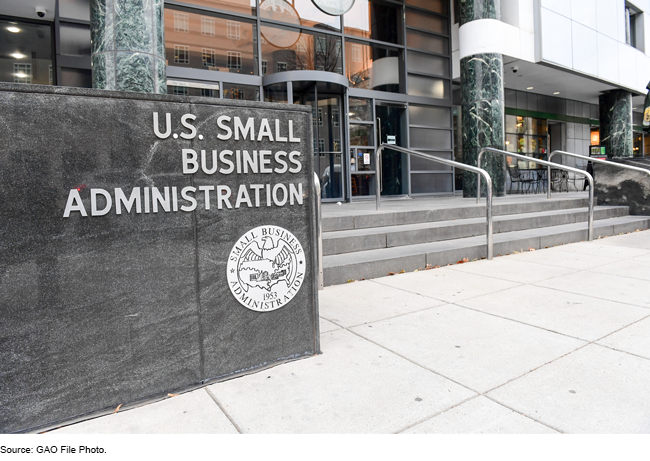Small Business Innovation Research: Most Agencies Did Not Implement Required Commercialization Pilot
Fast Facts
Federal agencies help fund small businesses' technology development through grants and other awards. This Q&A report looked at a pilot program that could provide more funding for small businesses to bring their technologies to the market.
Since the pilot began in 2018, only the Department of Energy's Office of Science has used it. Other agencies didn't implement the pilot as required because they don't work with any eligible small businesses or already had similar programs in place. We also found that the Small Business Administration doesn't report on the pilot's activities.
We made recommendations to address these issues.

Highlights
What GAO Found
The Small Business Innovation Research (SBIR) program provides federal funding to small businesses to help them develop and commercialize innovative technologies. In fiscal year (FY) 2023, agencies made over 5,000 SBIR awards valued at nearly $4 billion to small businesses, according to SBA data. Federal agencies grant SBIR funding through Phase I and Phase II awards. Phase I awards fund small businesses to determine the feasibility of an idea. Phase II awards fund continued technology advancement, such as the development of prototypes.
All 11 federal agencies that participate in the SBIR program were required to implement the Commercialization Assistance Pilot Program (CAPP), enacted in 2018, or receive an exception from doing so, by August 2019. CAPP allows small businesses that have received a second Phase II award to apply for a third Phase II award from the same agency that it received its second Phase II award from to continue to develop their technologies and progress toward commercialization. However, only the Department of Energy's Office of Science implemented CAPP and made awards under the program. The office made seven CAPP awards between FY 2019 and FY 2024.
Agencies may apply to the Small Business Administration (SBA) for an exception from CAPP if they operate sufficiently similar programs. SBA granted such exceptions to the National Aeronautics and Space and Administration and the National Institutes of Health, a component of the Department of Health and Human Services.
CAPP awards could help small businesses cross the valley of death—the gap in support between early technology development and commercial success. Small businesses working on technologies with long development timelines in particular can benefit from additional funds to help them survive the valley of death. Some CAPP awardees told us the program helped them advance their technologies toward commercialization.
GAO found that SBIR programs at six of the 11 agencies that participate in SBIR did not implement CAPP because they do not issue second Phase II awards, known as "sequential" awards. As a result, no small businesses in their SBIR programs would have been eligible for a CAPP award, which would be a third Phase II award.
SBA, which oversees SBIR, provided guidance to agencies in 2019 and 2020, but SBA took limited steps after that to ensure that agencies either implemented the pilot or applied for an exception. In addition, while SBA has the authority to monitor and report on SBIR operations, including CAPP, it has not collected and reported information on CAPP implementation and awards. Such reporting could provide information on challenges SBIR participating agencies face in implementing CAPP and can also provide insights to shape the future of the pilot. The pilot program will terminate on September 30, 2025, unless its period of authorization is extended.
Why GAO Did This Study
Small businesses have been a major source of technology development in the U.S. economy but can face challenges obtaining the funding and support needed to fully develop and commercialize their technologies. The SBIR program was established to increase the participation of small innovative companies in federally funded R&D. In 2018, the Small Business Act was amended to establish CAPP.
The Small Business Act includes a provision for GAO to conduct a study of agencies' implementation of CAPP. This Q&A report provides information on CAPP awards made and small businesses experiences with CAPP. It also provides information on challenges agencies faced implementing the pilot and SBA's oversight of the program.
GAO reviewed agencies' data on CAPP and other SBIR awards, analyzed SBIR solicitations and other documents, and interviewed small business representatives and SBIR program officials from SBA and all 11 participating agencies.
Recommendations
GAO is recommending a matter for congressional consideration and making one recommendation to SBA. If Congress wishes to reauthorize CAPP, it should consider clarifying which agencies are required to implement CAPP because not all SBIR participating agencies offer sequential Phase II awards.
If the CAPP program is reauthorized, the Administrator of SBA should direct the SBIR Program Office to collect and report information from SBIR participating agencies on CAPP—such as implementation status, number of awards, and dollars awarded. SBA concurred with our recommendation.
Matter for Congressional Consideration
| Matter | Status | Comments |
|---|---|---|
| If Congress wishes to reauthorize CAPP, it should consider clarifying which agencies are required to implement CAPP because not all SBIR participating agencies offer sequential Phase II awards (Matter for Consideration 1). | When we confirm what actions the agency has taken in response to this recommendation, we will provide updated information. |
Recommendations for Executive Action
| Agency Affected | Recommendation | Status |
|---|---|---|
| Small Business Administration | If the CAPP program is reauthorized, the Administrator of SBA should direct the SBIR Program Office to collect and report information from SBIR participating agencies on CAPP—such as implementation status, number of awards, and dollars awarded (Recommendation 1). |
When we confirm what actions the agency has taken in response to this recommendation, we will provide updated information.
|
